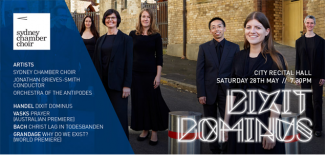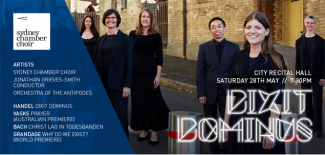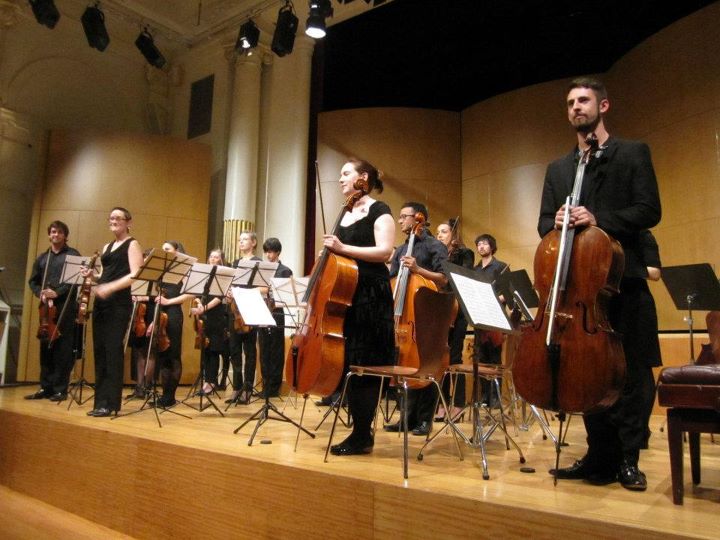Concert Review: Dixit Dominus/ Sydney Chamber Choir

Sydney Chamber Choir, Jonathan Grieves- Smith guest conductor
Dixit Dominus
City Recital Hall,
May 28, 2016
The two giants of the Baroque faced off against each other, straddling two smaller contemporary works, when the Sydney Chamber Choir performed with guest conductor, Jonathan Grieves-Smith and the Orchestra of the Antipodes, led by Matt Bruce. It was an assemblage of some of Sydney’s finest choral and Baroque stringed-instrumental talent.
Both Baroque works, J S Bach’s Christ lag in Todes Banden BWV 4 and Handel’s Dixit Dominus, HWV 232, were composed in 1707 when their composers (born within a month of each other) were in their early twenties. Each masterpiece is a portent of the musical genius to come and both are brilliant in expressing the text. However, there the similarity ends, with an exciting divergence of style that affords a contrast and comparison of Bach’s religious aesthetic against Handel’s venture into a more operatic, Italianate style. A clever stroke of programming.
Christ lag in Todes Banden BWV 4 (Christ lay in death’s bonds) is a cantata for Easter, one of the earliest church cantatas he wrote. John Eliot Gardiner describes it as Bach’s “first-known attempt at painting narrative in music”. The narrative that Bach paints is a hymn of seven stanzas by Martin Luther from which Bach created this seven movement cantata.
Given the dolourous setting of the cantata, and the prevalence of the same key throughout, its mood can become burdensome. However, Grieves-Smith maintained interest with measured tempi and stylish phrasing. After a delicate opening sinfonia, the chorus performed the symmetrically arranged choral movements with their trademark clarity of tone and unerring pitch, delivering an intense climactic middle movement where Life grapples Death. The solo movements were sung by each entire section with sympathetic continuo accompaniment from cellist Anthea Cottee and Joanna Tondys playing a 2004 organ from The Netherlands.
Latvian composer Pēteris Vasks’ Prayer (Lord, open our eyes), with words by Kathryn Spink, was an Australian premiere performance. It is a deeply engaging work which expresses complex musical and emotional ideas. The orchestra continued to play on their Baroque instruments, giving the contemporary harmonies of Vasks’ 2011 incantation an unusual overlay. Following a sweeping instrumental opening, the choir ended the middle contrapuntal section in an anguished high cry. The muted strings accompanied the voices holding an unwavering pedal point in unison as the instruments took the chorale to an optimistic end in a major key. It is a unique work that reflects Vasks’ ethical principles and treats the chorus and orchestra as equal partners.
Why Do We Exist by Iain Grandage, received its world and Australian premiere during the evening, having been commissioned by patrons James O’Toole and Kate Friis for the marriage of their son Ben to Valeska. The only secular piece in the programme, the composer nonetheless describes Chris Wallace Crabbe’s poem as “a humanist prayer to nature and innocence.” Grandage’s style is immediately appealing and his depiction of the Australian aesthetic in music is alluring. This work did not disappoint and I hope it will be performed again often.
Finally, the piece de resistance with the cascading G minor arpeggios of Handel’s electrifying 5 part Vesper psalm Dixit Dominus – a brilliant example of how to make music in a minor key sound celebratory. Handel wrote this soon after his arrival in Rome, which, after the more sober traditions of German music must surely have been something of an awakening. It is evident in this feverish setting.
It is a demanding work for any choir and the Sydney Chamber Choir more than met the challenge. The choir’s thrilling declamatory opening phrases, crystal clear streams of counterpoint and vivid word painting were performed with a cohesive sense of ensemble.
The soloists were somewhat swamped in the brief coloratura passages of the opening chorus but they soon redeemed themselves in the solo arias and duets. Natalie Shea’s aria Virgam Virtutis was exceptionally beautiful with a rich and creamy tone underlying a seamless phrasing with discreet yet solid continuo accompaniment from Anthea Cottee and Joanna Tondys.
Soprano Josie Ryan sang the relentlessly high triplets of Tecum Principium with a silken legato; her voice blending beautifully with Belinda Montgomery in the soprano duet De torrente in via bibet, incandescent above the males’ mystical chanting in unison.
Ryan and Montgomery were joined by tenors Owen Elsley and Chris Othen and bass Ed Suttie in Dominus a dextris tuis, exploiting the syncopated rhythms to underscore the power of God over His enemies.
The drama intensified with the final almost militaristic chorus Gloria Patri et Filio. The choir did full justice to the complex fugue and leaping octaves in the upper voices over a D pedal point in the bass line, culminating in an outpouring of triumph and jubilation.
As an encore, we were treated to a complete contrast – an impeccably controlled, pure-toned rendition of Ego flos campi by Jacob Clemens non Papa, a work of and unflagging beauty, performed in the early a capella style that the Sydney Chamber Choir performs so well.
Shamistha de Soysa for SoundsLikeSydney©







